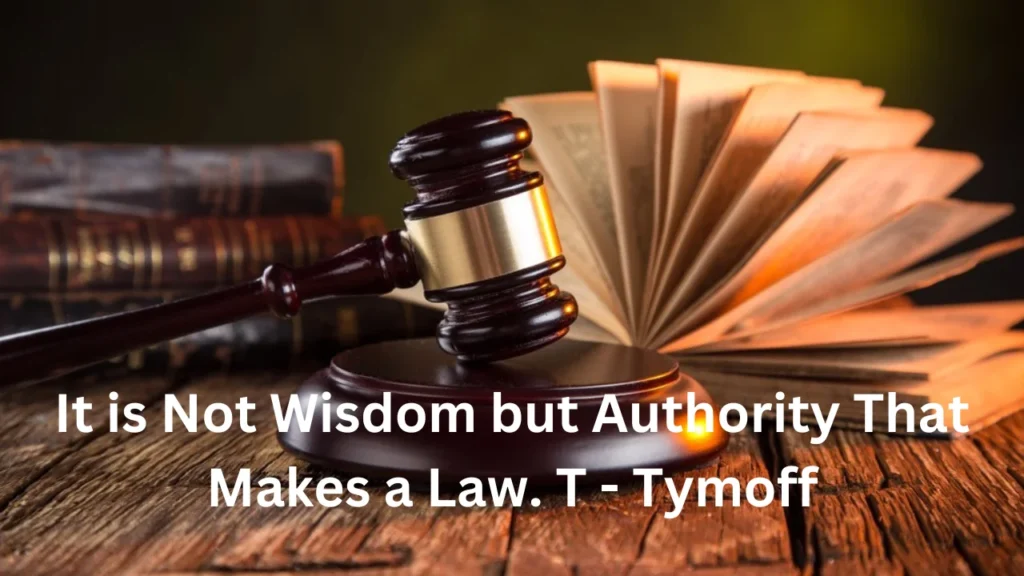Introduction
In the realms of law and governance, Thomas Hobbes‘s thought-provoking quote in his book “Leviathan,” “It’s not wisdom but authority that creates law,” this quote has sparked considerable debate and contemplation. Questioning conventional legal foundations, this aphorism prompts exploration into the complex interplay of authority and wisdom in shaping societal laws.

Authority and the Enforcement of Law: “It’s not wisdom but authority that creates law” – Tymoff. On the other hand, it’s impossible to overlook the role played by authority in enacting and maintaining laws. Governments and legislative bodies formulate laws, and they also have the power to enforce these laws through designated agents. Authorities ensure compliance with laws and impose punishment or penalties on those who violate them, essential for maintaining order and preventing chaos in society.
However, Thomas claims that authority, not wisdom, is the true creator of law. It argues that the enforcement of unjust or oppressive laws can occur solely through authority, without regard for knowledge and fairness. Laws cannot serve the best interests of those they govern when they are solely based on the whims of the powerful.

The Essence of Authority
Power in Legislation
At first sight, it may seem that the essence of law lies in its wisdom, derived from the societal knowledge and moral compass. However, a closer examination reveals that authority plays a crucial role in the creation and enforcement of laws.
Authority vs. Wisdom
The Role of Authority
Authority, often vested in governing bodies or individuals, holds legal and institutional power to enact and uphold laws. It’s essential for any legal system as it provides the framework within which wisdom can operate.
The Element of Wisdom
While authority determines the stage, wisdom contributes to the standards and fairness in laws. Wisdom encompasses ethical considerations, societal values, and the ability to anticipate consequences, all necessary for fair and just legislation.
Interaction Between Authority and Wisdom
Striking a Balance
To achieve effective and equitable laws, a delicate balance between authority and wisdom is necessary. Excessive authority can lead to arbitrary or unfair laws, while too much emphasis on wisdom can undermine their enforcement and societal order.
Authoritarian Influence on Laws
Throughout history, we observe examples where authoritarian regimes have enacted laws, often to maintain control, whether or not they are inherently just or rational.
Reforms under the Leadership of Wisdom
Conversely, significant moments in history testify to the triumph of wisdom over mere authority. Reforms driven by societal wisdom and moral conscience have led to reconsideration of unjust laws.

Modern Applications
Contemporary Legal Systems
In today’s world, governments and legal systems work together to make and enforce laws. Elected representatives create laws based on what people know and need, and institutions make sure these laws are followed.
Ethical Considerations
Moral Imperatives
Contemporary legal debates often revolve around ethical considerations. Laws should not only be documented but also reflect the societal wisdom and values upon which they are based.
Consensus and Adaptation
In a rapidly changing world, legal systems must adapt to societal principles and values. This requires a dynamic interaction between authority and wisdom to ensure that laws remain relevant and equitable.
Conclusion
Thomas Hobbes’s claim that “It’s not wisdom but authority that creates law” encapsulates the complex relationship between these two elements within the realm of law. While authority provides the legal framework, wisdom serves as the ethical compass guiding the formation of fair and just laws. An ideal legal system is one that harmonizes these two aspects, acknowledging that both are essential for the well-being of society.
FAQs on Wisdom and Authority in Law:
Who is credited with the quote, “It is Not Wisdom but Authority That Makes a Law”?
T. Tymoff is often attributed to this quote; however, some historical sources credit Thomas Hobbes with coining a similar expression in “Leviathan.”
How can wisdom be applied to contemporary law?
In modern lawmaking, wisdom can be applied by incorporating insights from legal experts, community representatives, and ethical considerations. This collaborative approach helps create just and equitable laws.
What happens when wisdom is ignored in drafting laws?
Ignoring wisdom in lawmaking may lead to the passage of unjust or unfair laws, risking social unrest and discontent. Balancing wisdom and authority is crucial for effective and just legal systems.
Can laws shift from being authority-centric to wisdom-centric?
Yes, legal systems can evolve towards a more wisdom-driven approach by including citizen participation, professional counsel, and ethical considerations in the drafting of laws.
How does the idea affect societal perceptions of justice?
The interplay between authority and wisdom significantly impacts how society views justice. Achieving a balance ensures that laws are just, fair, and in the best interests of all members of society.
Who first used the expression “It is not Wisdom but Authority that makes a Law”?
The quote is commonly attributed to British historian Edward Gibbon, not T. Tymoff. Gibbon’s views emphasize the role of authority in making laws.
How does authority maintain legitimacy in lawmaking?
For authority to maintain legitimacy, it must respect a social contract and uphold a baseline level of justification and accountability. The governing body should represent the will or values of those it governs.
What role does wisdom play in law, according to historical philosophers?
Historical philosophers such as Plato, Aristotle, and Aquinas believed that wisdom, derived from reason and ethical considerations, plays a crucial role in crafting just laws.
Why is finding the right balance between wisdom and authority essential in lawmaking?
Finding the right balance ensures that laws are fair, flexible, and enduring. Wisdom brings empathy and context, while authority provides structure and enforcement.
How does the evolving world impact legal systems?
In an ever-evolving world, legal systems must adapt to changing societal norms. This requires a dynamic interplay between authority and wisdom to ensure laws remain relevant and just.








